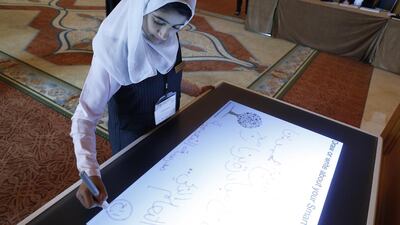DUBAI // Imagine a school where pupils arrive at class and beg their teachers for an exam.
It may sound far fetched, but Khalid Al Hammadi thinks he knows how to make it a reality, with inspiration from video games.
The head of research and development for the Mohammed Bin Rashid Smart Learning Programme believes all it takes to turn schoolchildren from average pupils into supersmart bookworms is a little “game-ification” or, to put it simply, applying video game mechanics and rewards to engage them.
“A student will have his own profile where he has his own trophies,” said Mr Al Hammadi. “If he see more videos he will have more trophies, he will enrich his profile. He will be unique within his colleagues.
“Then he could go to his teacher and ask for an exam because marks on exams will convert to points where he can go and buy new trophies or a new look for his profile.”
Game-ification is one of several high-tech learning tools and concepts Mr Al Hammadi and others at the Smart Learning Programme are looking to introduce to government schools across the country.
“We have a lot of cool things that we are testing now, which we need to align with educational outcomes so that it’s really helping education,” he said.
Another idea is augmented reality. This would allow a student to scan an object with his tablet computer and then interact with it.
“If he saw a picture of a heart, he could put his tablet in front of it and he will see it in 3D, and he can play with it and learn more things about it,” said Mr Al Hammadi.
Since its launch last year, the multimillion-dirham programme has replaced traditional blackboards in classrooms with new smartboards and placed tablet computers in the hands of 9,963 seventh graders and 1,439 eighth-graders in 123 public schools.
This followed a successful pilot involving 14 schools in 2012.
It is funded by the Telecommunications Regulatory Authority’s Information and Communication Technology Fund, in partnership with the Ministry of Education.
Private corporations including Samsung, HP, Microsoft, Etisalat, Intel, IT Worx Education and Siveco have joined in, offering products and services free or at a discount.
These companies, along with other Smart Learning stakeholders, participating schools, teachers and students, were recognised at an awards ceremony attended by 500 guests and dignitaries. The ceremony also marked the completion of phase one of the programme.
“There hasn’t been any programme of this scale implemented in the world that we can benchmark against,” said Mohammed Gheyath, the Smart Learning Programme director general.
“We measure the programme’s success in terms of implementation and not necessarily the outcome.”
The awards ceremony rewarded Maryam Alfaini, who teaches maths at Al Nawf Secondary School for Girls, for putting her lesson plans on YouTube.
Twelve-year-old Saif Zuhair from Al Shafeyi Basic School for Boys was rewarded for developing an interactive game he uses to teach his classmates maths.
His prize was an Xbox, a not-so-subtle symbol of the future of teaching, says Mr Gheyath.
“Gaming is so intuitive with students and children and so addicted because it’s a rewarding approach rather than lecture,” he said.
“If you sit with a child and you talk with the child, the child will reach a point where the boredom will dominate and he will start to oppose you.
“But if you give him a game, the child will never stop because it has the incentive approach where you move from one level to another level. And education is becoming like this now.”
rpennington@thenational.ae

